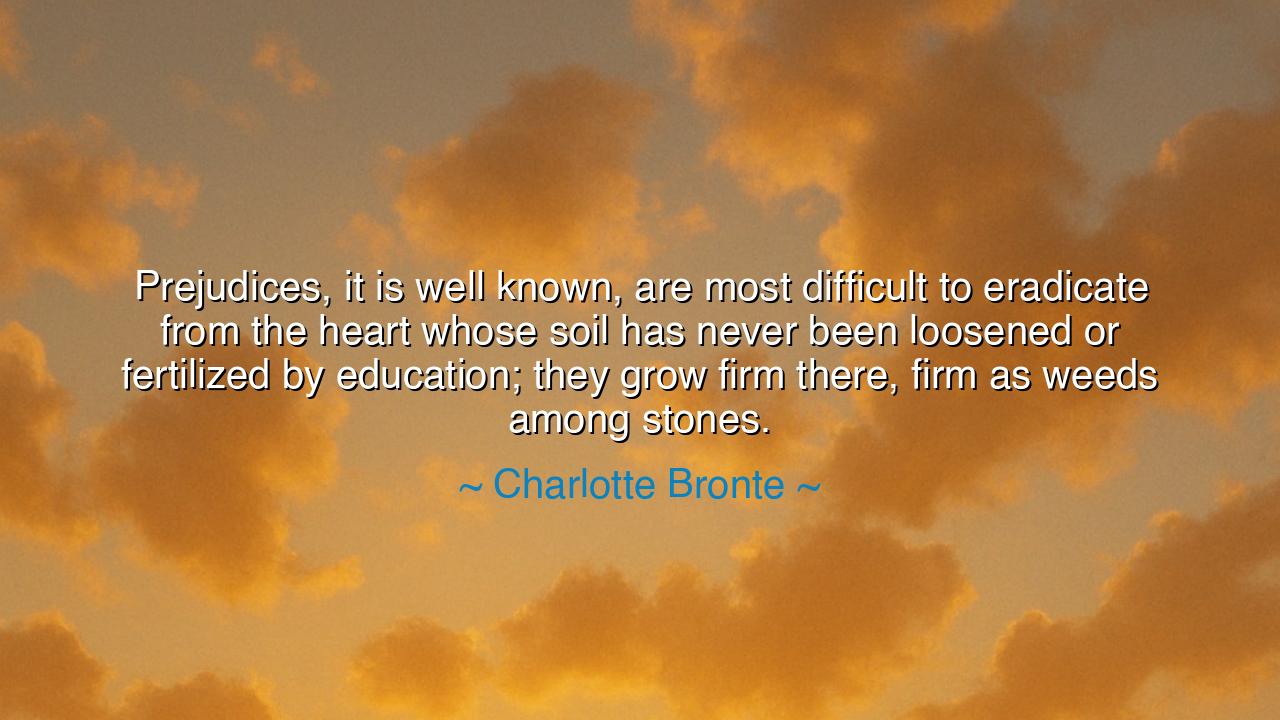
Prejudices, it is well known, are most difficult to eradicate
Prejudices, it is well known, are most difficult to eradicate from the heart whose soil has never been loosened or fertilized by education; they grow firm there, firm as weeds among stones.






"Prejudices, it is well known, are most difficult to eradicate from the heart whose soil has never been loosened or fertilized by education; they grow firm there, firm as weeds among stones." Thus spoke Charlotte Brontë, one of the great voices of the nineteenth century—a woman of fierce intelligence and deep moral vision. In this single sentence, she reveals a truth both ancient and enduring: that ignorance is not an empty field, but a hardened one—barren, unyielding, and fertile only for the growth of prejudice. The heart that has never been softened by learning, or opened by understanding, becomes like stony ground where falsehoods take root and flourish.
Brontë lived in an age when education was still denied to many—especially to women and the poor—and she saw with her own eyes how ignorance breeds arrogance, and isolation breeds fear. Born into a small Yorkshire village, she taught herself and her siblings through books and imagination, escaping the confines of her world through the light of learning. Her words come not from theory but from life. She knew that prejudices—whether of class, gender, or creed—cling most tightly to those who have never learned to question them. Without education, the mind remains closed, and the heart becomes a fortress against truth.
To understand her wisdom, one need only look to history. In every age, it is ignorance that has fueled hatred—the weeds among stones that choke compassion and reason. Consider the long shadow of slavery in the 18th and 19th centuries. Many who defended that cruel institution were not monsters by nature, but men whose hearts had never been “loosened” by education—who never examined the humanity of those they enslaved. It took thinkers, reformers, and teachers—men and women whose minds had been cultivated by learning—to expose the evil of such prejudice and to uproot it from the soil of society. Education was the plow that broke the hardened earth.
Even in more recent times, we have seen how prejudice survives where understanding is absent. When the fires of racism, fanaticism, or nationalism flare, they burn brightest among those who have never been taught to think beyond their narrow walls. Ignorance binds people to their fears; education frees them to see the shared humanity of all. The uneducated heart clings to division; the educated heart learns empathy, the highest fruit of wisdom. Brontë’s image of weeds among stones is thus more than poetic—it is prophetic. For if we do not teach, we will reap hatred; if we do not cultivate, we will harvest cruelty.
Yet, in her metaphor, there is also hope. The soil of the heart, though hardened, is not dead. With effort—with education, patience, and love—it can still be loosened, still be made fertile again. A mind long closed can still open to light; a heart long cold can still be warmed by truth. The great teachers of the world—those who educate not only minds but souls—are the gardeners of humanity. They turn the stony ground into living earth. Their work is slow, sometimes painful, but the harvest is eternal: tolerance, wisdom, and peace.
The ancients would have understood this well. Confucius taught that education is not only the cultivation of the intellect but the refinement of virtue. Socrates believed that ignorance is the root of evil, and that the examined life is the only one worth living. Brontë, standing centuries later, echoed their wisdom with her own poetic fire. For her, ignorance was not simply a lack of knowledge—it was a moral danger, a poison that hardens the soul. Only through education, she believed, can humanity rise above its baser instincts and become capable of justice, mercy, and truth.
Let this be the lesson passed down to all generations: guard your heart against ignorance as you would against disease. Seek learning not for pride, but for humility. Read, question, listen—let your mind be tilled by truth and your heart softened by understanding. Wherever you see prejudice, know that it is not born of strength but of emptiness. And wherever you teach, remember that you are not merely filling a mind—you are loosening the soil of the human heart so that compassion may take root. For as Charlotte Brontë taught, only through the gentle labor of education can we turn the barren fields of ignorance into gardens of wisdom and grace.






AAdministratorAdministrator
Welcome, honored guests. Please leave a comment, we will respond soon